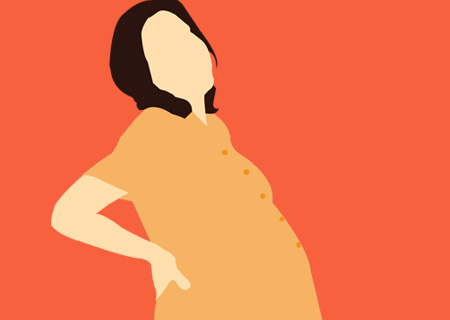Cramping is pretty common among pregnant women, and really having a list of treatments for cramping during pregnancy wouldn’t hurt anyone in particular. When pregnant, a woman’s body undergoes a number of changes, right from increase in weight to stretching of the uterus. To-be-mothers may experience between mild to severe cramping, depending on the phase of pregnancy and condition causing it. The reasons are many and not every cramp is to be taken lightly. But how do you differentiate? When is it really a risk? Read on to know more.
Causes:
1. For women, who’ve had an implantation, suffering from cramps identical to menstrual ones is common in early stages. Typically it is observed when implantation has occurred.
2. The second trimester usually sees women suffering from mild cramps due to the stretching of the uterus ligaments.
3. Muscles in the uterus stretching at infrequent time intervals, often lead to Braxton Hicks or false labor in the course of the third trimester.
4. Sometimes, cramping during pregnancy could be an indication of something more serious like a miscarriage. And more often than not, these kinds of cramps come along with bleeding or spotting. Ectopic pregnancy which is known to be of serious nature, in most cases also causes abdominal pain and cramping.
5. Many a times, women suffering from gas and constipation also experience cramps. Food poisoning, kidney or urinary infection and pre-eclampsia are some of the other causes of cramps.
6. Besides abdominal cramps, a large number of women also face cramps in their leg muscles, which again is pretty common. The main reason for leg cramps are changes in circulation or the increase in body weight.
Treatment:
Posture – The handiest tip to remember for pregnant women, when they experience abdominal cramps is refraining from changing their posture quickly.
Exercise – If you know, you are having gas problems, walking may help relieve you. Gentle exercises that include bending and stretching could also be helpful. Regular exercise may in fact be helpful in avoiding leg cramps too. The key is to stay as active during pregnancy as possible. You can indulge in fun activities like swimming and yoga too, after consulting your doctor.
Diet – With virtually everyone offering you advice on what you must and mustn’t eat, it can get confusing for sure. Stick to the basics, and try to eat as much as green vegetables and fruits as you can. Foods rich in magnesium and vitamin C may prove beneficial in lowering the frequency of cramps. For mommies-to-be suffering from leg cramps often, increasing calcium intake is advised. Don’t curb cravings, but eat in moderation. With many women reporting of constipation during pregnancy, adding fibrous foods to your diet will help as well.
Salt – Another factor that most pregnant women ignore is lowering their intake of salt. Salt, when consumed in excessive amounts has the tendency to cause fluid retention. Hence, it’s best to keep salt consumption to a minimum low, while also cutting down on processed foods, junk and sodas. The main reason is that the latter are generally considered to be foods having a high salt content.
Water – The importance of water is ignored by most of us in our routine lives. So we really can’t blame you, if you aren’t giving it much of a though when pregnant. But yes, keeping your body hydrated can help tackle many issues. Besides drinking water, a warm bath could also help relax stretched muscles.
Sex – While most health caretakers are of the opinion that it is safe to have sex after consulting your doctor, it’s best to avoid it. No, contrary to popular belief, intercourse does not cause any problems, but may lead to spotting. So if you’re having way too many irregular occurrences of cramping during pregnancy, abstaining from sex is the best way to add to your already unsettling condition.
Alternate Therapies – Heat therapy works really well for relieving cramps and pain. Remember to keep the heating pad warm though and not hot. In addition to heat, aroma therapy has its benefits too. You can seek professional help and apply oils best suited for you. In general, chamomile oil is known to lower spasm while lavender oil helps relieve pain.
When to seek medical help?
While cramping during pregnancy is a perfectly normal occurrence, you could seek medical help if the cramps are severe in nature. Specifically, painful cramps in early stages of pregnancy are more often than not an indication of ectopic pregnancy. In addition to this, cramping along with heavy bleeding, fever, spotting and vaginal discharge should also see you rushing to the doctor.
In Conclusion:
Do not self-administer medicines by asking your friends and family for cramps. Really what may have worked for somebody else may not necessarily work for you. Always consult your doctor before deciding to pop a pill. Even as you try to lead an active lifestyle, ensure that you aren’t overworking your body. Rest adequately, and ensure that you aren’t tired. Do not underestimate the power of staying happy; it can do wonders for not just your health, but also your baby’s.

